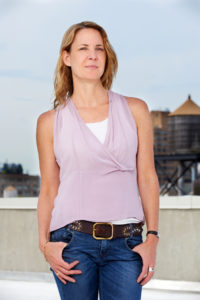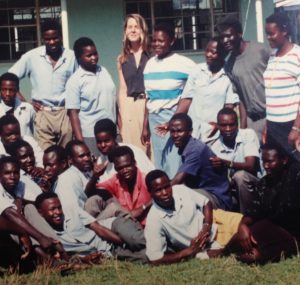Talking to Executive Editor Jocelyn Zuckerman (Kenya)
Jocelyn Zuckerman is the Executive Editor of Modern Farmer. She is also the former executive editor of Whole Living, deputy editor of Gourmet, and articles editor of On Earth. She is also a recipient of a James Beard Award for feature writing and of fellowships from the Peter Jennings Project and The Carter Center….as well, she is a former PCV in Kenya. She is also the mother of two lovely daughters and lives with her husband in Brooklyn. What more would anyone want? Well, we decided she needed to be interviewed for our site.
What is this all about, Jocelyn…. in your bio from Modern Farming As a teacher in Kenya, Jocelyn once opened her door to find a particularly grateful student bearing a live chicken in a plastic bag.
Oh, the mag wanted some little anecdote involving farming. I had a student I was very close to when I was a PCV in Kenya. He was eager to learn everything, including French, so he would come over to my house for lessons. One day he showed up with a chicken as a way to say thank you. I had some of the other teachers over and we slaughtered and cooked it.
Okay, Jocelyn, what’s your history?
Well, I grew up in South Orange, NJ, and attended Hamilton College. I went into the Peace Corps to Kenya where I taught English and math at a secondary school near the Ugandan border. When I came home I attended Columbia University Graduate School of Journalism, was married my high school sweetheart.
And then in the world of work?
Yes, I worked at Gourmet for 12 years, ending as deputy editor. Since then, a few staff gigs at magazines and lots of freelance writing, mostly focused on the environment, agriculture, the developing world. Also taught at the J-School. When I am not traveling or editing, I’m working on a book proposal.
Does any of your professional writing today relate to your tour?
I would say that everything I am doing now stems from my experience in Peace Corps. My focus in the book I’m working on is palms, how this crop is devastating the environment and the lives of peasants around the world. The crop grows best at ten degrees to the north and south of the equator, which is right where my village was in Kenya. I have dreams about going back there and finding that the whole thing has been planted with palm — as has already happened in thousands of villages across Indonesia and Malaysia and, increasingly, in sub-Saharan Africa and Central and South America. Most of it traced to processed food, cosmetics, and biofuels for wealthy countries
You say you were a secondary school teacher on the western boarder of Kenya, near Uganda. You may know being a reader of Paul Theroux that his fourth novel Girls at Play, published in 1984, was set in a secondary school in Kenya. As the time, Paul’s future wife was teaching at this boarding school and he would visit from Kampala, where he was teaching at the University. Now this was before your time in Kenya, but have you read that novel? If so, what do you think of it?
Based on your recent travels in the developing world, what is your take on the countries where PCVs have been assigned?
Well, I’ve traveled to a bunch of places in the developing world—Asia, Latin America, Africa—and I think the answer varies depending on the specific locale. When I go to Kenya, I am struck by how huge Nairobi has become, with endless fancy suburbs. But the slums also go on and on, and when you get out to the countryside, it doesn’t feel very different from the way it was 25 years ago. The one bright spot is cellular phones. Everyone’s got one, and that has at least made day-to-day life a little more efficient. But corruption is still killing these places. (I do have high hopes for solar power and what that might do for Africa and other developing countries.)
I realized you didn’t do much farming in South Orange, New Jersey, but were you exposed to farming in Kenya? Is that where you developed this interest in farming?
I didn’t farm myself, but I was in a rural area where everyone was a farmer. I remember my students saying to me, “You don’t have a shamba [farm]? Then where do you get your food?” The idea of a grocery store was completely alien to them. It was interesting to then land at Gourmet, where the idea of food was so different, and so removed from the ground. The interest in agriculture really grew out of my intense interest in sub-Saharan Africa, where farming is just what you do.
Q When you won your fellowship from the Carter Center what did you do with the funding?
I used the funding to travel to Haiti a handful of times. I did various magazine stories about mental health issues in the aftermath of the earthquake. In truth, I found Haiti very difficult. I remember talking to a journalist for the L.A. Times who had covered Africa for years and then spent some time in Haiti. She said something about how the latter was missing the joy that was such a part of the African experience, even amid the hardship and chaos. A cliche, of course, but it’s true there’s lots of laughing and goofing around in Africa. In Haiti, people seemed really pissed off, understandably… I’m not eager to go back.

Great story, John! The exemplary service and impressive career of Ms. Zucherman is a testament to the value of the Peace Corps experience. Thanks to her!!
Great to hear Jocelyn’s views and influences and that she’s keeping up her meaningful work!
While attending Njoro Boys School in 1968, our English teacher was a Ms. Zuckerman, a young Peace Corp. She was one of the best teachers we ever had and we all loved her very much. Are you related?